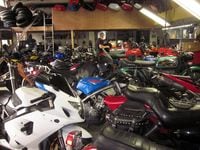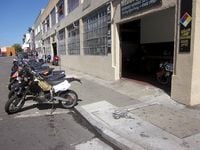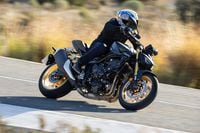"Get the *&%@ outta here!" I growled at the disheveled, middle-aged man rifling through plastic storage bins full of tools in our shop's basement. In an instant he stopped and looked up, his eyes the size of ping-pong balls. As I escorted him from the building, barking obscenities to further my point, I reflected on my own lapse of diligence in leaving the basement door briefly unlocked in San Francisco's Mission District, where our shop, Werkstatt Motorcycles, is located.
In the Midwest where I grew up in the '70s, bike shops were not the glamorous palaces of two-wheeled consumption we are familiar with today. Back then shops were often dingy, isolated hovels on the bad side of town, probably adjacent to a liquor store or massage parlor. They had steel bars on the windows and graffiti on the walls and were usually staffed by unscrupulous rip-off artists and half-competent mechanics secure in the knowledge that they were the only game in town. Of course there were some shops run by passionate bikers who made their living selling parts and services to an extended family of customers, but these were less common where I came from. Evaluating a shop between these two extremes required insider knowledge.
Now I'm 30 years and thousands of miles away from these recollections, but some things still haven't changed. San Francisco's Mission District is the Greenwich Village of the West Coast, for better and worse. It's a conglomeration of American, Latino, and Bohemian cultures, with both foo-foo wine bars and shady check-cashing joints, innumerable taquerias and hipster cafés, as well as an abundance of bike shops serving San Francisco's vast and varied motorcycling population.
Our workshop has been in its current location for 14 years. Before that, founder Jennifer Bromme ran it out of a welding shop on Harrison Street. The location is part necessity, part choice. Rent is cheap. Space is abundant. And supervision is minimal. Two full-time mechanics crank out work on customers' broken bikes. Parts and service managers work phones and computers nonstop to fill orders. My machine shop sits in one corner: a Bridgeport mill, 12-inch swing lathe, TIG welder, and various other tools used to bang out racebike parts. Our massive parts stash permeates every nook of the brick building. Thirty-odd empty Ducati engine cases snake around the upper mezzanine. A collection of Guzzi V50 engines covers the nearby floor. Ducati trellis frames hang haphazardly from a pallet rack 8 feet above the floor, like a levitating, cubist jungle gym.
The showroom is up front. A '73 Guzzi Eldorado greets customers, alongside its kid brother, a 1964 Gilera 100cc single. An 888 Ducati in streetfighter trim challenges the assumptions of discerning Ducatisti from its defensive corner repose. Some are permanent residents, like Jennifer's Rickman Kawasaki she inherited from the estate of a close customer. Guest bikes come and go.
Mission mores are equal parts Golden Rule and, "Do what thou wilt." Test runs up and down our street on an open-megaphoned Ducati racebike barely elicit a second glance from Mission denizens. Testing shop pal Jim Hoogerhyde's 200-mph, 120-dB turbo GSX-R1000 land speed racer on our unenclosed dynamometer only slightly inconveniences our neighbors.
The Mission has its hazards, too. Along with the small-time thieves like Basement Guy, the neighborhood is thick with hustlers and other lowlifes. We have nicknames for the local prostitutes: "Tattoo Girl," "Screamer," and others not fit to print. Bikers still garner some respect around here, though. We at the shop generally reciprocate. Respect makes a good force field in The Mission.
Times have changed since I was a kid. Today, some bike shops let you essentially purchase a biker identity by handing over your Platinum Visa. But I can still draw a straight line between the grungy motorcycle shops of my childhood and our little slice of urban motorcycle paradise here at 17th and Capp Street in the San Francisco Mission.













/cloudfront-us-east-1.images.arcpublishing.com/octane/QSTCM6AVEZA5JJBUXNIQ3DSOF4.jpg)
/cloudfront-us-east-1.images.arcpublishing.com/octane/U4I7G625B5DMLF2DVIJDFZVV6M.jpg)
/cloudfront-us-east-1.images.arcpublishing.com/octane/B6XD6LS6IVCQPIU6HXDJSM3FHY.jpg)
/cloudfront-us-east-1.images.arcpublishing.com/octane/ICL63FEDDRDTTMINYICCEYGMDA.jpg)
/cloudfront-us-east-1.images.arcpublishing.com/octane/FCGZHQXRBZFLBAPC5SDIQLVF4I.jpg)
/cloudfront-us-east-1.images.arcpublishing.com/octane/WNOB6LDOIFFHJKPSVIWDYUGOPM.jpg)

/cloudfront-us-east-1.images.arcpublishing.com/octane/X33NU3E525ECRHXLNUJN2FTRKI.jpg)
/cloudfront-us-east-1.images.arcpublishing.com/octane/6KKT5NNL2JAVBOXMZYS5ZO76YA.jpg)
/cloudfront-us-east-1.images.arcpublishing.com/octane/J5RKG5O455GMPGQRF2OG6LRT7A.jpg)
/cloudfront-us-east-1.images.arcpublishing.com/octane/GX2CIZKQVRH2TATDM26KFG2DAE.jpg)
/cloudfront-us-east-1.images.arcpublishing.com/octane/ZWIDYSAKQZHD5BHREMQILXJCGM.jpg)
/cloudfront-us-east-1.images.arcpublishing.com/octane/CYUHJZCTSJCH3MRAQEIKXK7SCQ.jpg)
/cloudfront-us-east-1.images.arcpublishing.com/octane/LKOFINY56FCXJCANJ5M7ZDQUBY.jpg)
/cloudfront-us-east-1.images.arcpublishing.com/octane/4NBPDACMWJH63JQYJVK3QRBDZI.jpg)
/cloudfront-us-east-1.images.arcpublishing.com/octane/KKHQHRR3FJGX7H2IPU6RALMWG4.jpg)

/cloudfront-us-east-1.images.arcpublishing.com/octane/5IOFS5JAE5FOXMNA23ZRAVVYUU.jpg)
/cloudfront-us-east-1.images.arcpublishing.com/octane/CGXQ3O2VVJF7PGTYR3QICTLDLM.jpg)

/cloudfront-us-east-1.images.arcpublishing.com/octane/OQVCJOABCFC5NBEF2KIGRCV3XA.jpg)
/cloudfront-us-east-1.images.arcpublishing.com/octane/OPVQ7R4EFNCLRDPSQT4FBZCS2A.jpg)
/cloudfront-us-east-1.images.arcpublishing.com/octane/YBPFZBTAS5FJJBKOWC57QGEFDM.jpg)
/cloudfront-us-east-1.images.arcpublishing.com/octane/W5DVCJVUQVHZTN2DNYLI2UYW5U.jpg)